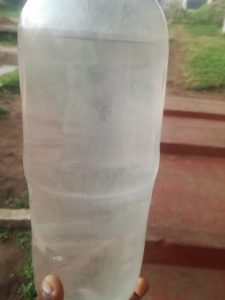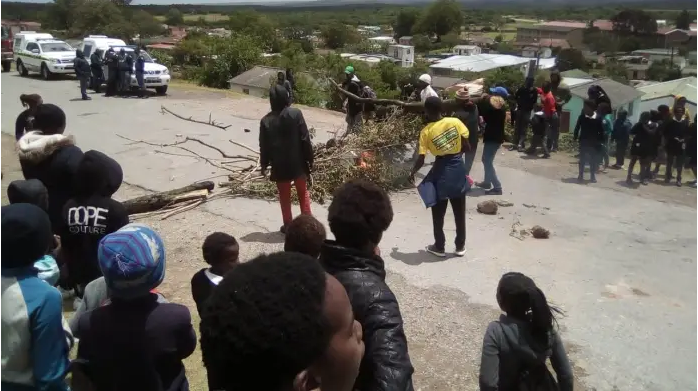By Sinalo Peyi
Bathurst Location Community, located in the Eastern Cape, has been having problems with the water supply for many years, even before the location was expanded to include some surrounding residential areas. Bathurst has historically drawn water from the Golden Ridge Dam, the original source of water for the community. But in 2018 and 2019, with the severe drought that hit the Eastern Cape, including the Golden Ridge Dam and Bathurst, another source of water needed to be considered. The municipality responsible, Ndlambe Municipality, sourced water from the Lushington River as an emergency to recover from the drought. The river was also necessary to support the growing community.
On August 10, 2023, Bathurst community members reported that the water they were using was not clean and had a bad smell. Community members who fell sick have laid the blame on the water, as it looked like it had ‘white powder’ inside or ‘snow’, and was causing illnesses such as rashes and diarrhoea. In fact, churches, crèches, schools, clinics, and many households have stopped drinking or cooking with water and are now relying entirely on rainwater.

The unsafe tap water has created huge worry in citizens about their health and that of the children who live in the community. Mother and member of the community, Lulama Peyi (53), is one of the affected victims who became sick after using the tap water to drink and cook. She told Karibu! that the water smells like ‘fish’, and tastes like ‘burnt tyres’.
“I have been sick for more than a week with my children, and 6-year-old grandchild who cannot go to school because of the diarrhoea. It is sad because we do not have tanks for [collecting]rainwater and now we have to drink less water and be dehydrated,” she said.
The water crisis has been ongoing for a while, but community members do not know who to go to for help. Peyi stated that she had initially thought that the water only had a bad taste, and didn’t realise how dirty it remained even when it was boiled.
Khonziwe Msimang (46), another mother and member of the Bathurst community, says the water gave her such painful diarrhoea that she stopped using tap water to drink or cook, and now only uses the water to clean the house and wash her clothes. “At times the water looks so dirty like it was drawn from a dirty hole, and it smells like sea water too.”
She says she is scared for her son’s health which is why she decided to speak out about the water. “The municipality is ignorant and people do not want to speak against them, for they fear being unemployed all their lives,” said Msimang.
Ostracisation is a common tool used by the powerful in the area, she said. Msimang stated that the water looks like it has snowflakes in it, and is oily, and argues that there is no way that the water can be safe if it looks like that. Msimang normally relies on rainwater, but since it has not rained in a while, she has been forced to use the dirty tap water and now has diarrhoea as well as a rash on her chest.
Sub-Regional Convener of the South African National Civics Organisation (SANCO), Maradona Swaarbooi (33), says water cleanliness was a big problem, but that that has now changed, and the water is clean and ready to be used. “I have seen nothing wrong with the water ever since I joined [SANCO] leadership. People did not have a problem with the water in July 2023,” he said.
After seeing the pictures of the water and of those community members who had fallen ill, Swaarbooi said that he saw nothing wrong with the water and added that the victims could not know for certain that their illness was caused by dirty water. He stated that he could only take seriously such complaints if the community member who fell sick had a doctor provide medical evidence that the water was the cause of the illness. Swaarbooi argued that the pipes were new, and were repaired less than five months ago. He said that he could not commit to fixing any problem if no evidence was provided, regardless of what the victims have said.
The current councillor of Bathurst, Mzwandile Sweli (32), said that by the time he came into the community’s political leadership, water was already being drawn from Lushington River. He states that one of the first things he did as local party leader, was to request that more water be supplied to the Expansion Water Treatment [plant]to ensure that it provides clean water that is safe for drinking. Like Swaarbooi, he also argued that even with the pictures of the water and of the body of one affected victim, he was sure that the water was clean. He admitted, however, that the municipality does not conduct door-to-door surveys to inquire into what the community has to say about service delivery.
Sweli said that he was not aware of complaints regarding the water but intends to send a representative of the municipality to check the taps of every affected community member and investigate what might be wrong.
(This article was first published on 1 September 2023 in Karibu! A Working Class Newspaper published by Khanya College. Sinalo Peyi is a feminist activist, a former student leader, and a member of the Isikhalo Womxn’s Movement against Gender-Based Violence and Femicide).


